
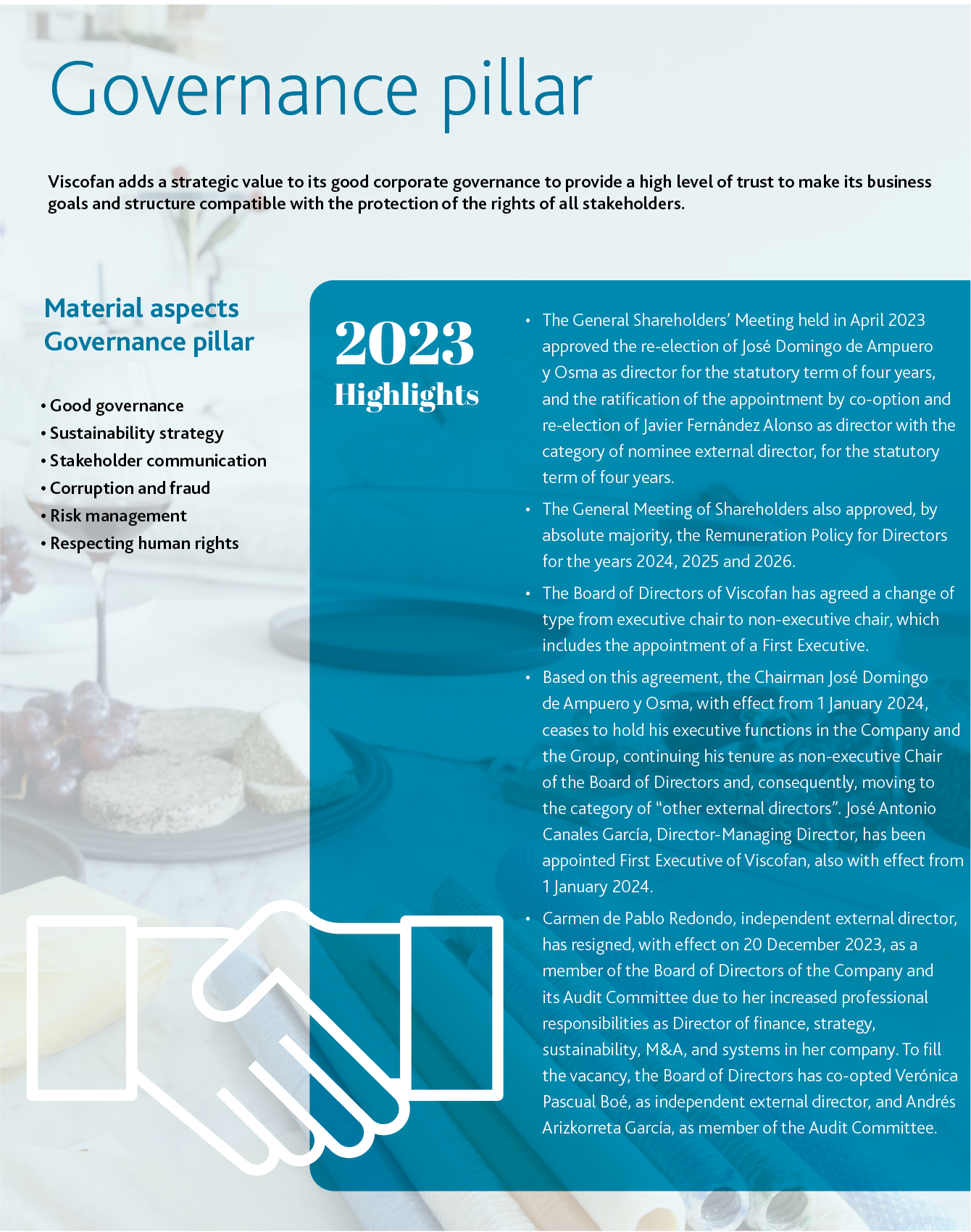
improve economic efficiency, integrate businesses, and bolster the trust of its shareholders and other stakeholders.
Good corporate governance is a key factor to generate value, improve economic efficiency, integrate businesses, and bolster the trust of its shareholders and other stakeholders, thanks to the appropriate division of functions, duties, and responsibilities, among all the Company’s governing and management bodies.
In recent years, it has progressively reinforced its structure to ensure the incorporation of the principles and best practices of good corporate governance, both nationally and internationally, adapting them to the circumstances of the Viscofan Group until reaching the best level of compliance.
The basis of the Viscofan Group's governance is its Articles of Association, the Regulations of the General Shareholders' Meeting (both updated at the General Shareholders' Meeting of
2022), the Regulations of the Board of Directors and the Regulations of the Board's committees, and it has general ethical principles and guidelines established by the Group's Code of Conduct.
In turn, the good governance commitment of the Company's Board of Directors is expressed in its General Sustainability Policy, which aims to set out the basic principles and commitments that should govern the Group's sustainable development strategy.
This strategy, expressed in the new 2022-2025 Sustainability Action Plan, seeks to favour a culture of best practices in sustainability, and contribute to improving people's well-being, boosting the economic, environmental, and social development of the communities in which the Viscofan Group is present, and creating value in a sustainable manner through its ethical performance vis-à-vis all its stakeholders.
Proof of this is the new Beyond25 Strategic Plan, which redefines the business model with a market approach and adds Sustainability as a new transversal pillar of the company.

Alongside this, the General Sustainability Policy is organised into specific policies in the main axes of sustainability procedures:
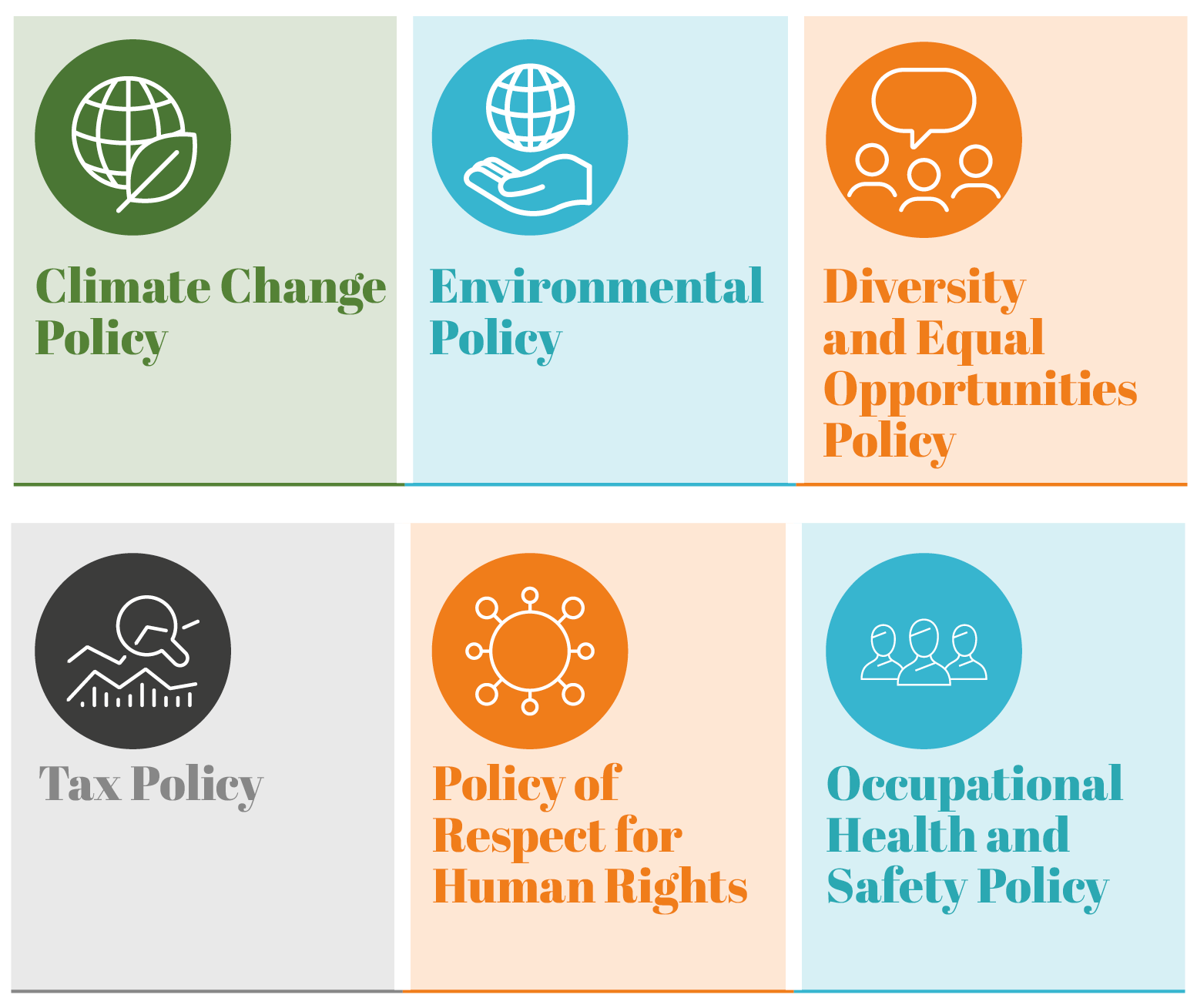

The governance structure of Viscofan is based on two main bodies: the General Shareholders' Meeting and the Board of Directors.
In recent years, Viscofan has been pursuing a series of initiatives to promote transparency, communication and shareholder participation at the General Meeting.
maintaining the high attendance percentage at the General Meetings of recent years.
At 31 December 2023, the Parent Company is aware of the following significant interests:
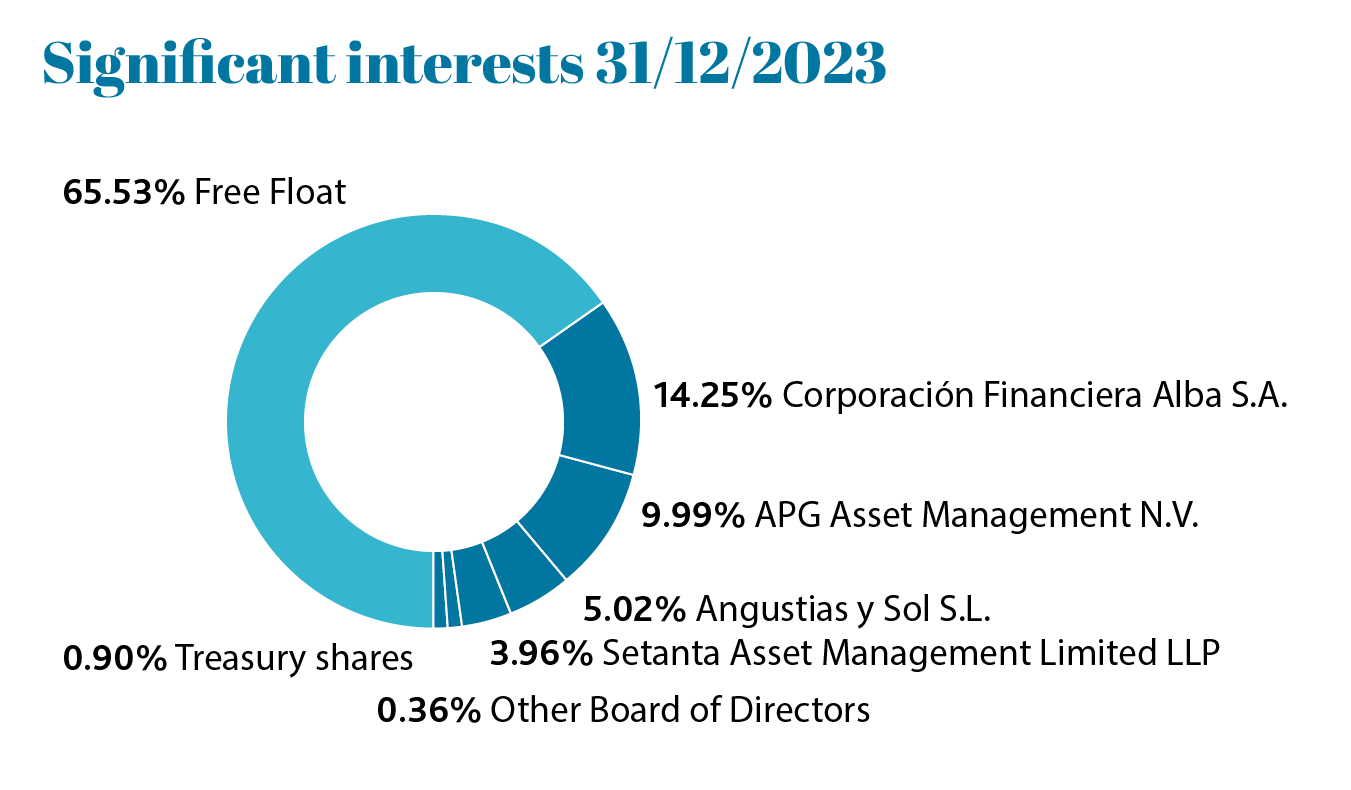
The General Shareholders' Meeting is the supreme governing body of the Company in which shareholders decide by a majority vote on the affairs within the scope of their authority.
Viscofan has established the principle of “one share, one vote” which promotes equality among all of the company's shareholders. There is only one class of shares, giving the same rights and obligations to all of the Company's shareholders. There are no restrictions to voting and no limit to the number of votes that can be cast by a single shareholder.
In recent years, Viscofan has been pursuing a series of initiatives to promote transparency, communication and shareholder participation at the General Meeting, including information on the items on the agenda, an attendance premium of €0.01 per share, facilitating remote voting, electronic voting, electronic forum and a questionnaire to answer the most common questions regarding the General Meeting.
As a result of all these measures, the 2023 General Meeting for the year was attended by 86.1% of the company's share capital, maintaining the high attendance percentage at the General Meetings of recent years, above the average for listed companies, which is especially significant taking into account the company's high floating capital.
The breakdown of data on attendance at General Meetings in recent years is as follows:
| Data on attendance at General Meetings | ||||
| General Meeting | 27/04/2023 | 29/04/2022 | 23/04/2021 | 24/04/2020 |
| % present | 20.1% | 19.9% | 19.3% | 19.2% |
| % in representation by proxy and distance voting | 66.0% | 62.8% | 62.8% | 68.4% |
| Total attendance | 86.1% | 82.7% | 82.1% | 87.6% |
In addition, the General Meeting is broadcast live on the internet and can be accessed via the Company's website, although the connection to this broadcast is not considered to be telematic attendance at the General Meeting.
Is the body in charge of representing and managing the Company and it is governed by the Regulations of the Board of Directors. Its essential function is the approval of the strategy, the basic policies, the preparation of financial statements and, in short, the general supervision of all aspects forming part of Viscofan S.A. and, where appropriate, of the companies forming its group of companies guided by corporate interest.
Composition at 31 December 2023
The Board of Directors consists of eleven directors, of which two are executive, two are nominee, one is other external directors and the other six are independent, thus complying with the good corporate governance recommendations stating that the number of nominee and independent directors should constitute an ample majority on the Board of Directors. The Secretary to the Board of Directors is not a director.
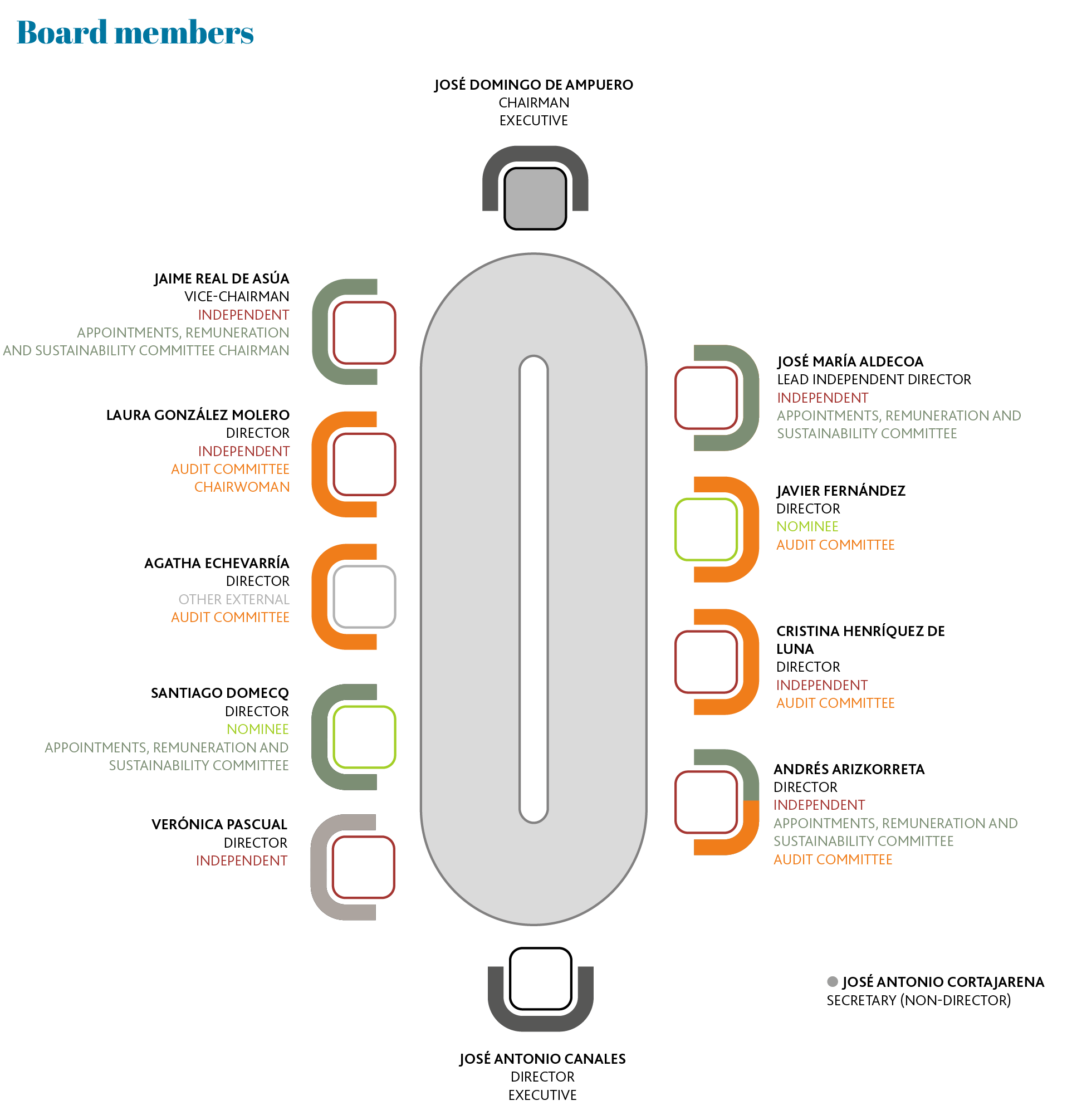
The Board of Directors of Viscofan has agreed a change of type from executive chair to non-executive chair, which includes the appointment of a First Executive. Based on this agreement, the Chairman, José Domingo de Ampuero y Osma, with effect from 1 January 2024, ceases to hold his executive functions in the Company and the Group, continuing his tenure as non-executive Chair of the Board of Directors and, consequently, moving to the category of “other external directors”. José Antonio Canales García, Director-Managing Director, has been appointed First Executive of Viscofan, also with effect from 1 January 2024.
Carmen de Pablo Redondo, independent external director, resigned with effect on 20 December 2023 as a member of the Company's Board of Directors and its Audit Committee. This resignation was preceded by a letter addressed to all the directors in which she explained that her increased professional responsibilities as Director of finance, strategy, sustainability, M&A, and systems in her company make it difficult for her, at the present time, to combine these responsibilities adequately with the functions required as a director in Viscofan.
To fill the vacancy left by Mrs. de Pablo, and at the proposal of the Appointments, Remuneration and Sustainability Committee, the Board of Directors has co-opted Verónica Pascual Boé as independent external director. Verónica Pascual Boé has accepted her appointment as a director of the Company. Also at the proposal of the Appointments, Remuneration and Sustainability Committee, Andrés Arizkorreta García has been appointed as a member of the Audit Committee to fill the vacancy of Carmen de Pablo Redondo.
The selection of Directors is specifically regulated in the Policy on the Selection of Directors and Diversity on the Board of Directors to ensure that proposals for the appointment or re-election of directors are based on a prior analysis of the skills required by the Board of Directors.
The selection of Directors is specifically regulated in the Policy on the Selection of Directors and Diversity on the Board of Directors to ensure that proposals for the appointment or re-election of directors are based on a prior analysis of the skills required by the Board of Directors and to encourage the diversity of knowledge, experience, age and gender required on the Board at all times, taking into account the vacancies to be covered and the structure and composition of the Board.
This policy establishes the principle of diversity. Based on this, the selection of directors should be guided by the aim of achieving a diverse and balanced composition of the Board of Directors which would contribute different points of view to the discussions it holds, thus enriching the decision-making process. Thus, in the selection of candidates for board members, consideration will be given to candidates whose appointment contributes to increasing the diversity of knowledge, skills, experience, origins, nationalities, age, and gender. The selection process should avoid implicit biases that may imply discrimination and, in particular, the selection of female directors is actively promoted. To this end, when the Appointments, Remuneration and Sustainability Committee or the Board itself, as the case may be, has to propose the appointment or re-election of directors, without prejudice to respect for the competence matrix, the inclusion in the process of candidates who contribute to incorporating directors of the least represented gender is actively sought and, when faced with two similar professional profiles, the female candidate will be chosen.
Consequently, the Appointments, Remuneration and Sustainability Committee, in view of the vacancy left by Carmen de Pablo Redondo, carried out a search for the most suitable profiles for joining the Board of Directors based on the provisions of the above Policy and finally proposed the appointment of Verónica Pascual Boé as a new director, thus maintaining the number of directors of the less represented gender on the board at 36%.
In addition, the Appointments, Remuneration and Sustainability Committee in compliance with Recommendation 14 of the Good Governance Code of Listed Companies (GGC) and the Selection and Diversity Policy, in relation to the prior analysis of the needs of the Company and the competencies required by the Board of Directors regarding the proposals on the composition of the Board of Directors for the General Shareholders' Meeting of 2024, issued a report on 15 February 2024, which will be made available to the shareholders, proposing the reduction of the number of members of the Board of Directors from eleven (11) to ten (10) members, considering that this maintains a balanced and diverse composition and, in particular, the percentage of women out of the total number of members of the Board of Directors will reach 40% (compared to 36% as at 31 December 2023), reaching the target of female representation set out in recommendation 15 of the GGC.
The curricula and profiles of the members of the Board of Directors at 31 December 2023 are detailed in section C.1.3 of the Annual Corporate Governance Report forming part of this Management Report. They are also available on the Company's website, in the Corporate Governance section.
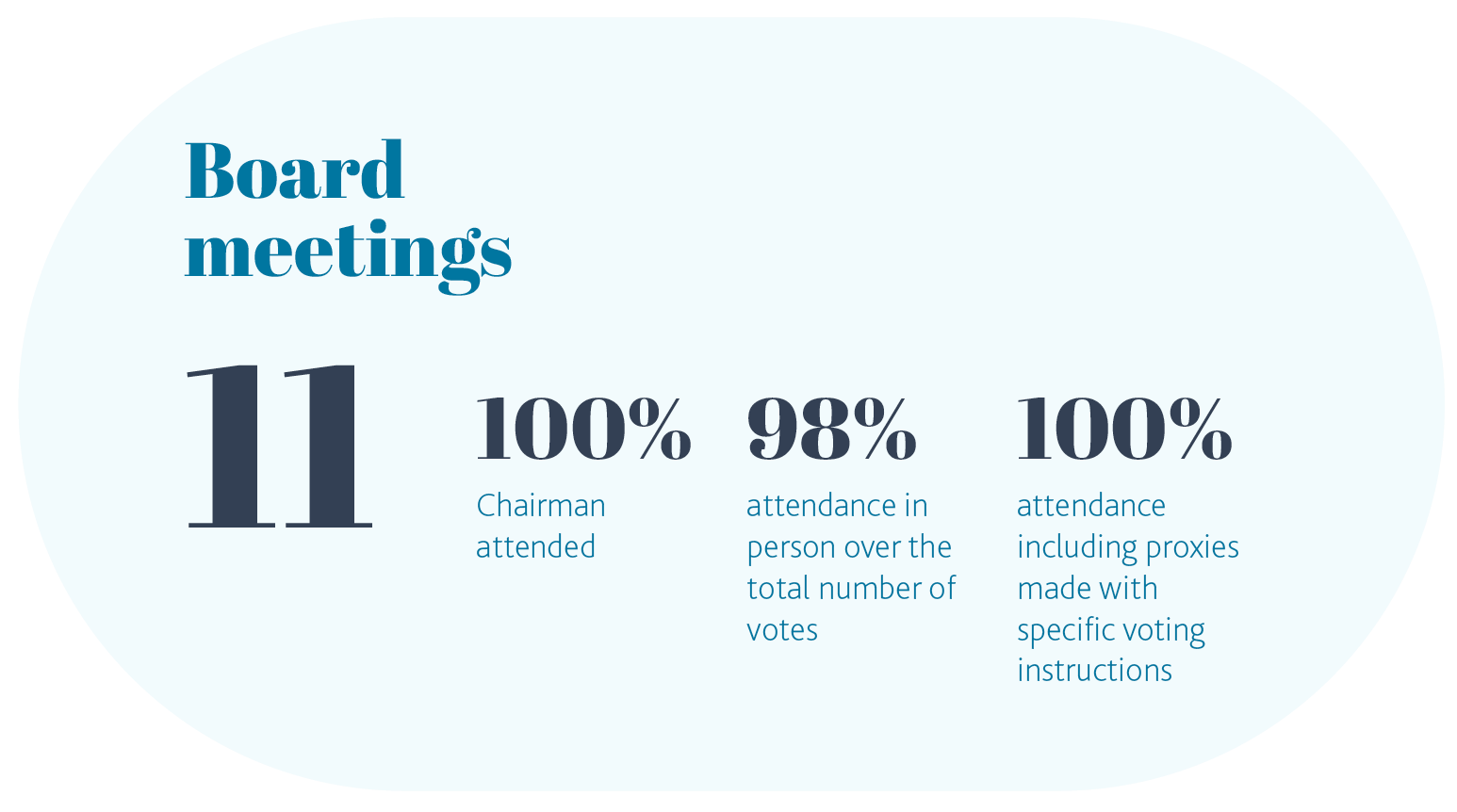
To perform their duties with the required rigour and efficiency, the Company's Board of Directors prepares an annual schedule of meetings and the annual work plan of the Board itself and of its various committees, so that the directors can better plan and to facilitate their commitment to and attendance of meetings. Directors receive the information they need well in advance, including, as appropriate, the minutes or reports of the different Board Committees.
Actions are still being carried out to guarantee the participation of the directors, facilitating their dedication and attendance to the meetings, to provide them with tools to give more in-depth knowledge of specific aspects of the activity and specific environments of the different production centres, thus improving the monitoring of the strategy of the Group and of each of its companies.
In addition, the annual plan includes visits to some of the Group's production centres and the participation of executives to enable enhanced monitoring of the implementation of the Group's strategy and of the management of each of its companies.
Throughout 2023, the Board met 11 times, the Chairman attended 100% of the meetings, there was 98% attendance in person over the total number of votes during the year, and 100% attendance including proxies made with specific voting instructions.
In addition, during the 2023 financial year, the Lead Independent Director, as part of his duties set out in the Regulations of the Board of Directors, held three meetings with non-executive directors to voice their concerns, and was also available for dialogue with investors and shareholders who so requested.
The Board of Directors carries out an annual evaluation of the quality and efficiency of the operation, diversity, and competencies of the Board itself and of the Committees - which is promoted by the Appointments, Remuneration and Sustainability Committee, and coordinated by the Lead Independent Director in the case of the evaluation of the Chairman.
Every three years, the Board of Directors is assisted by an external consultant in this evaluation process, whose independence is verified by the Appointments, Remuneration and Sustainability Committee. In 2022, Korn Ferry was consulted to facilitate this evaluation after three years since the last external advice.
The assessment of performance in 2023 was made on the basis of a questionnaire whose purpose was to provide a specific view for each director with regard to both strong and weak points, as well as any other suggestions they may have with a view to improving the efficiency of the Board and of the Committees.
The result of the questionnaire was analysed by the Appointments, Remuneration and Sustainability Committee of which the Lead Independent Director is a member, by the Audit Committee itself with regard to its own assessment, and the conclusions were presented to the Board of Directors, where the process was concluded, and a plan of action approved to include the appropriate improvements.
As a result of the annual evaluation, during the 2023 financial year the transition to a non-executive chair model and the appointment of a First Executive have been carried out. This change became effective on 1 January 2024. Furthermore, because of the annual evaluation of the Board, Committees and Executive President in 2023, it is expected that, by the time of the 2024 General Shareholders' Meeting, to reach the objective of 40% women on the Board of Directors and the review of the number of members of the Appointments, Remuneration and Sustainability Committee and its composition to incorporate members of the less represented gender.
The Board of Directors carries out an annual evaluation of the quality and efficiency of the operation, diversity, and competencies of the Board itself and of the Committees - which is promoted by the Appointments, Remuneration and Sustainability Committee, and coordinated by the Lead Independent Director in the case of the evaluation of the Chairman.
The Remuneration of the Board of Directors for the 2023 financial year is regulated in the directors' remuneration policy, approved at the General Shareholders Meeting held on 23 April 2021, valid for three financial years (2021, 2022 and 2023).
The General Shareholders Meeting held on 27 April 2023 approved the director remuneration policy for the years 2024, 2025 and 2026. It is available on the company's website in the Corporate Governance section.
This policy establishes a remuneration system for directors based on (i) their capacity as such and (ii) specific executive or senior management functions. The new policy has been adapted to a remuneration structure so as to provide for the necessary elements for the transition in 2024 from the current executive chair model to a Board of Directors led by a non-executive Chair and the appointment of a First Executive.
In the short term, variable remuneration included specific targets for CO2 emissions and improved accident rates.
In addition, the General Shareholders' Meeting held in April 2022 approved a Long-Term Incentive in shares and cash for executive directors, members of the management team and other employees of the Viscofan Group for the 2022-2024 period. This plan sets out the delivery of an amount in cash and shares in the Company based on the fulfilment of certain objectives for the creation of shareholder value and sustainability, including the reduction of the intensity of Scope 1 and 2 emissions, the improvement in accident rate indicators and the performance of audits of suppliers on compliance with the Viscofan Group's supplier code of conduct.
The remuneration of the Board of Directors in the 2023 financial year was €3,114 thousand (€3,428 thousand in 2022) and is detailed in the Annual Report on Remuneration that forms part of this management report, available separately on the company's website in the Corporate Governance - Corporate Governance Reports section.
The Board has created two committees in support of its functions: the Audit Committee and the Appointments, Remuneration and Sustainability Committee.
The Audit Committee is formed by five members, all non-executive and a majority independent, appointed by the Board of Directors at the proposal of or pursuant to a report by the Appointments, Remuneration and Sustainability Committee, bearing in mind accounting, auditing and financial and non-financial risk management knowledge, skills and experience. Since the 2020 financial year, its chairperson has been the independent director Ms Laura González Molero.
The composition, functions, rules of organisation and operation, as well as the responsibilities conferred upon the Committee are regulated in the Articles of Association, in the Regulations of the Board of Directors, and in the Regulations of the Committee itself.
The Committee functions are detailed in section C.2.1 of the Annual Corporate Governance Report of this Management Report.
The Audit Committee met twelve times in the year. It has covered all its functions attributed with respect to the auditing of accounts, internal audits, financial and non-financial information, internal control and risk management systems, the Ethics and Regulatory Compliance Committee and related party transactions.
The procedures performed by the Committee in 2023 are detailed in section C.2.1 of the Annual Corporate Governance Report of this Management Report.

This Committee is composed of four non-executive directors appointed by the Board of Directors: three independent and one nominee director. It is chaired by the independent director Mr Jaime Real de Asúa.
The composition, functions, rules of organisation and operation, as well as the responsibilities conferred upon the Committee are regulated in the Articles of Association, in the Regulations of the Board of Directors, and in the Regulations of the Committee itself.
The Committee met nine times during the year. The main matters dealt with and analysed by the Committee in 2023, which have formed their main areas of supervision were, among other matters, issues of Corporate Governance and regarding the composition of the Board, the assessment of the Board of Directors and those relating to sustainability.
The Committee functions are also detailed in section C.2.1 of the Annual Corporate Governance Report of this Management Report.
The Appointments, Remuneration and Sustainability Committee met on nine occasions in 2023 and, whenever considered appropriate, the presence of the Chairman, Managing Director and senior management members was required.
The main matters dealt with and analysed by the Committee during the 2023 financial year and which have made up its main areas of supervision have been, among others, issues of Corporate Governance and on the composition of the Board, evaluation of the Board of Directors and Chief Executive, succession plans, updating the organisational structure, the governance model and the governing bodies of the Group's subsidiaries, remuneration policy, and the promotion and supervision of the sustainability strategy.
The procedures performed by the Committee in 2023 are detailed in section C.2.1 of the Annual Corporate Governance Report of this Management Report.

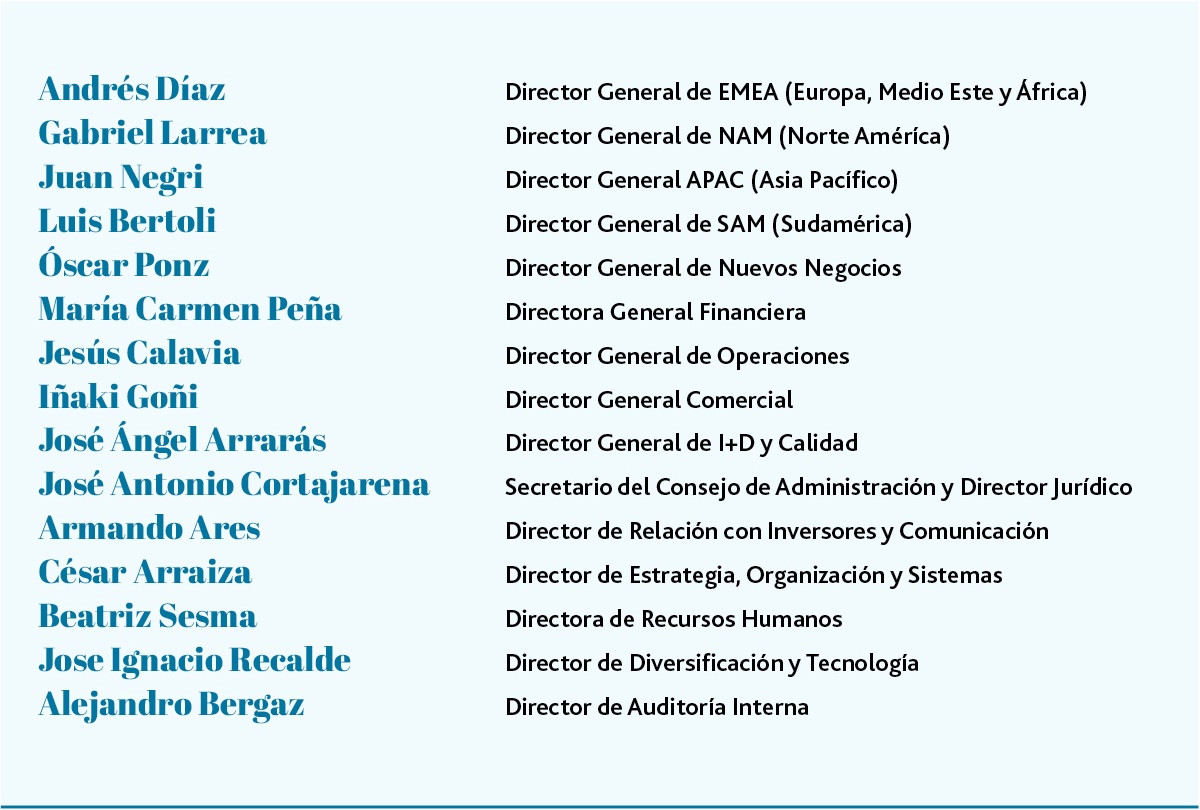
In 2023, remuneration received by key management personnel totalled €4,021 thousand (€4,234 thousand in 2022). In relation to the Long-Term Incentive Plan, a liability of €1,186 thousand was recognised in the year (€593 thousand in 2022).
These amounts do not include the remuneration of the two executive directors, José Antonio Canales García and José Domingo de Ampuero y Osma, which are detailed in the annual board
The Viscofan Group sets common basic guidelines on human rights as the guiding principles in various areas of the organisation. These guidelines can be grouped around 3 lines of action:
1) rights in relation to work – promotion of non-discrimination, free association of workers, integration of the people with functional diversity, rejection of child exploitation, rejection of forced labour and compliance with the minimum wage in each country, among others;
2) fight against corruption; and
3) the responsible management of the supply chain.
In the area of labour law, the following measures stand out:
• Promotion of the principle of mutual respect, honesty, and integrity: The Code of Conduct states that “We respect and promote respect for the personal dignity, privacy, and individual rights of all persons. In our day-to-day work we work inclusively with people of diverse ethnicity, culture, religion, age, disability, race, sexual identity, and gender”.
• Rejection of any form of child labour. Viscofan does not permit child labour and requests a similar commitment from its suppliers.
• Prohibition of forced labour. Viscofan promotes work in decent conditions, as well as the prevention of forced labour and consequently, as a control and monitoring measure, this risk is specifically included in the risk matrix of the Global Risk Committee in order to detect any violations.
• Protection of the free association of workers. 70% of the company's employees are covered by general collective bargaining agreements that regulate their employment activities, therefore improving the minimum conditions set by different labour legislation.
• Compliance training. Viscofan continues with training in regulatory compliance for all employees. Training has been designed in an attractive and multi-format manner that effectively trains employees in ethical standards that must be complied with and, at the same time, empowers all employees to combat any type of conduct that attacks the dignity of people in the employment environment or any corrupt procedures within the company.
• Site accessibility. Regarding the accessibility of people with disabilities, Viscofan does not have a global standard that regulates the accessibility of people with functional diversity at its offices and other sites. However, the company complies with all its local regulations and applicable building codes in the countries in which it operates.
• Salaries above the minimum wage of each country. The minimum remuneration of employees is considered in accordance with the salary level and legal rules of each country where Viscofan carries out its activities. Given the training needs, the characteristics of the production process, and the internal policies of the Viscofan Group that respect the current legislation in each country, the minimum remuneration of the workforce is not below the minimum wage established in the country.
• Supply chain: In line with the objective of extending responsible management to the supply chain, Viscofan's Board of Directors approved in 2022 the Supplier Code of Conduct which, among other aspects, establishes guidelines for compliance with laws, ethical behaviour, and labour practices. It has also established an audit objective of a 50% compliance with this code by main suppliers by the end of 2024, an objective linked to the Long-term incentive in shares and cash aimed at executive directors, members of the management team and other employees of the Viscofan Group.
Viscofan S.A. forms part of Sedex, the largest collaborative platform for the responsible sharing of supply chain data.
Uso de cookies
Utilizamos cookies propias y de terceros para analizar nuestros servicios y mostrarle publicidad relacionada con sus preferencias. Pulsando “Configurar” puede seleccionar las cookies que se instalarán en su dispositivo. Pulsando “Aceptar” consiente su instalación y el uso de todas las cookies que utilizamos. Puede obtener más información aquí.
ACEPTAR COOKIES Configuración de cookies